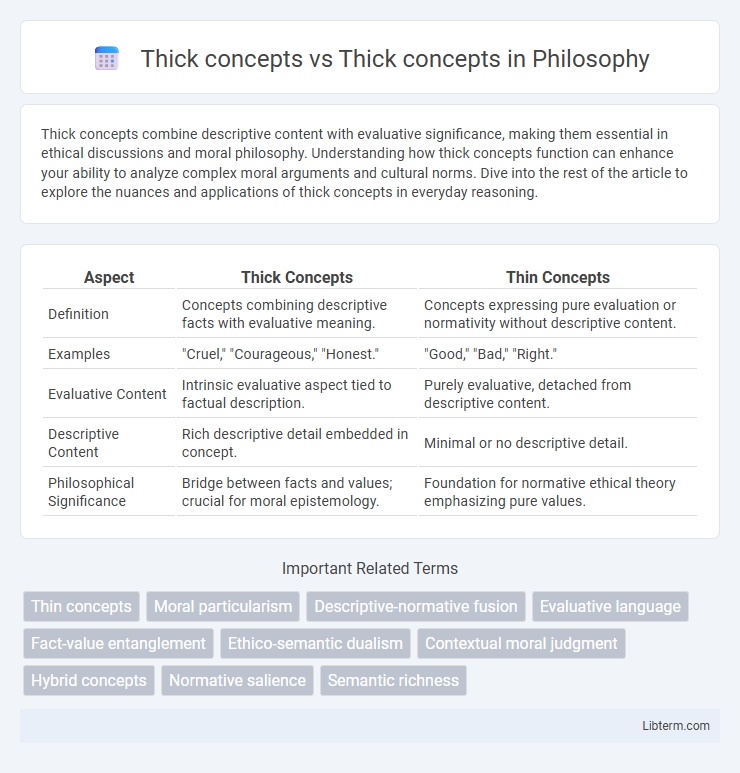Thick concepts combine descriptive content with evaluative significance, making them essential in ethical discussions and moral philosophy. Understanding how thick concepts function can enhance your ability to analyze complex moral arguments and cultural norms. Dive into the rest of the article to explore the nuances and applications of thick concepts in everyday reasoning.
Table of Comparison
| Aspect | Thick Concepts | Thin Concepts |
|---|---|---|
| Definition | Concepts combining descriptive facts with evaluative meaning. | Concepts expressing pure evaluation or normativity without descriptive content. |
| Examples | "Cruel," "Courageous," "Honest." | "Good," "Bad," "Right." |
| Evaluative Content | Intrinsic evaluative aspect tied to factual description. | Purely evaluative, detached from descriptive content. |
| Descriptive Content | Rich descriptive detail embedded in concept. | Minimal or no descriptive detail. |
| Philosophical Significance | Bridge between facts and values; crucial for moral epistemology. | Foundation for normative ethical theory emphasizing pure values. |
Introduction to Thick Concepts
Thick concepts combine descriptive and evaluative content, providing rich meaning that encompasses both factual information and moral judgment. Unlike thin concepts, which are primarily evaluative, thick concepts offer a detailed understanding of actions or qualities, such as "courage" or "cruelty," by capturing their nuanced social and ethical dimensions. This dual nature makes them essential in ethical discussions and philosophical analysis, as they bridge objective facts with subjective values.
Defining Thick Concepts: An Overview
Thick concepts possess both descriptive and evaluative dimensions, integrating factual content with moral or normative significance. They differ from thin concepts, which provide minimal descriptive content and primarily convey evaluative judgment, such as "good" or "bad." Understanding thick concepts is essential for analyzing complex ethical and social phenomena where meaning is deeply tied to cultural and moral contexts.
Origins and Philosophical Background of Thick Concepts
Thick concepts, originating in the works of philosophers like Bernard Williams and Elizabeth Anscombe, intertwine descriptive and evaluative elements, distinguishing them from thin concepts that are purely evaluative or descriptive. These concepts, such as "courage" or "cruelty," embody both factual content and moral significance, reflecting the complex nature of ethical language and moral reasoning. The philosophical background of thick concepts highlights their role in bridging objective descriptions with normative judgments, challenging the strict separation between facts and values in ethical theory.
Thick Concepts vs. Thin Concepts: Key Differences
Thick concepts integrate descriptive content with evaluative meaning, blending factual information and moral or normative judgments, unlike thin concepts, which purely express evaluative attitudes with minimal descriptive content. Thick concepts such as "courage" or "cruelty" convey both how things are and how they ought to be, making them central to ethical theory and practical reasoning. Thin concepts, like "good" or "bad," function primarily as evaluative markers without providing detailed information about the subject they describe.
The Role of Thick Concepts in Moral Philosophy
Thick concepts in moral philosophy combine descriptive and evaluative elements, providing rich, context-dependent meanings that shape ethical understanding. These concepts, such as "courage" or "cruelty," allow philosophers to analyze moral phenomena without separating facts from values, enhancing nuanced moral reasoning. Their dual nature plays a crucial role in bridging empirical observations and normative judgments in ethical discourse.
Challenges in Analyzing Thick Concepts
Challenges in analyzing thick concepts arise from their inherent combination of descriptive and evaluative content, making it difficult to separate factual information from moral judgment. Understanding thick concepts requires navigating complex cultural, historical, and contextual factors that influence their meaning and application. This complexity complicates efforts to provide clear definitions and consistent usage across different philosophical and practical domains.
Thick Concepts Across Cultures and Contexts
Thick concepts, rich in descriptive and evaluative content, vary significantly across cultures and contexts, reflecting diverse moral frameworks and social practices. These concepts, such as "honor" or "virtue," incorporate culturally specific meanings that shape how communities interpret ethical behavior and social norms. Understanding thick concepts across cultures requires analyzing their embedded cultural narratives and contextual nuances to grasp their full philosophical and social implications.
Debates Surrounding Thick Concepts
Debates surrounding thick concepts center on their dual nature as both descriptive and evaluative terms, challenging traditional distinctions between facts and values in philosophy. Scholars dispute whether thick concepts, such as "cruel" or "courageous," inherently embody moral judgments or can be neutrally described without evaluation. This tension impacts ethical theory, linguistic analysis, and metaethics by questioning how language conveys complex normative meanings intertwined with empirical content.
Applications of Thick Concepts in Contemporary Ethics
Thick concepts in contemporary ethics integrate descriptive and evaluative elements, enabling nuanced moral analysis and richer ethical discussions. Their application allows for context-sensitive judgments that recognize cultural diversity and situational complexity, enhancing ethical decision-making frameworks in fields like bioethics, legal theory, and social justice. The use of thick concepts supports resolving moral disputes by bridging factual details with moral evaluations, fostering empathy and deeper understanding in pluralistic societies.
Conclusion: The Future of Thick Concepts in Philosophy
The future of thick concepts in philosophy promises deeper integration of ethical and descriptive dimensions, enriching moral discourse with nuanced meanings. Advancements in cognitive science and linguistic analysis will likely refine the understanding of how thick concepts shape moral reasoning and social practices. Ongoing interdisciplinary research will enhance their applicability in addressing complex ethical dilemmas and cultural variations in value judgments.
Thick concepts Infographic

 libterm.com
libterm.com